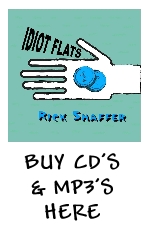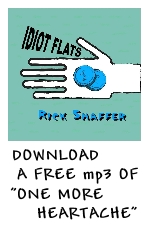
RICK SHAFFER: A LEGEND IN THE MAKING
Musician/Songwriter Rick Shaffer has worked with Peter Murphy and Marianne Faithful, as well as scoring film soundtracks and heading the successful indie band The Reds with Bruce Cohen. Not content to stop there, Rick recently released Idiot Flats, a solo effort that will make a believer out of you too!
- Rick, what inspired your style of playing?
My inspiration is derived from the song writing of my favorites like Bob Dylan, Jagger/Richards, Willie Dixon, and artists as diverse from my style as Miles Davis, and Laura Nyro. Plus the execution of the parts by individual players such as Magic Sam, Jessie Mae Hemphill, Slim Harpo, and B.B. King. As well as the overall production, sound and feel from producers like the Chess Brothers, Phil and Leonard, Phil Spector, and Joe Meek.
- I hear some country bluesy style with a psychedelic twist in your song One More Heartache, what made you decide to bring those elements together?
The country blues feel you hear is in the groove and rhythm section of the song understatedly supplied by Boo Boo Spencer, Les Chisholm, and Leon Wingfield, which give it the hill country blues swing. Then married with a 1960’s style R&B edge. I’m guessing the psychedelic “twist” you mention is my Premier Reverb tank, taking it to the limit. My production approach on this track was to really bring out the Mississippi Hill Country sound and Hasil Adkins primitive rhythm, tied together with an R&B style vocal, and Link Wray guitar style.
- Did you grow up listening to blues music?
Yeah, I did base my vocal, guitar and production style from listening to the blues very early on. Especially hearing it for the first time in early Rolling Stones, Pretty Things and Yardbirds records. They all led me to search out the masters of the blues like Muddy Waters, Elmore James, and Slim Harpo, among others. Coming from Philadelphia, R&B was a big influence from what I heard being played on the radio, along with all the great regional rock ‘n roll. The moment I was totally seduced by the blues was hearing B.B. King’s first notes on the Live At The Regal album. That clinched it for me.
- Describe your previous time with your band The Reds? What was it like to be in the band?
My time in The Reds was, and still is, a great experience. Bruce Cohen and I still work together, and continue to create new ideas and sounds. The band changed tremendously when we went to a duo and stopped performing live. We then began to focus on film and studio work, and lately we’ve been releasing solo albums. Bruce also has a jazz/psychedelic trio he put together in Miami, called Big Fun 3, who play live and record for Rope A Dope Records. Live touring with the original line-up, that included Jim Peters on bass, and Tommy Geddes on drums, was as good as it gets on the nights that you’re hitting the note. Those shows and times are indelible for me.
- How does being a solo artist affect your creativity compared to working with a band?
I don’t think it affects me creatively. It just makes for a different pace, depending on what I’m working on, or who I’m working with. If it’s doing session work with other artists, I’m on their schedule, with their material, which is the same with film directors. But, when I’m solo, my time is mine.
- Would you say your style has changed since you first started in a band and have gone solo?
I don’t, but die hard Reds fans may think so. To me, the first song on my new album, Unforgiven Man, is as hard edged and relentless as Victims on the first Reds album on A&M Records. But, it’s the old cliché, for the artist you’re killed if you changed, and you’re killed if you don’t. So, I just do what I want.
- What influenced you most into becoming a musician?
The desire to make noise, rock, express myself, and create new sounds. I’ve always been into the sound of records, especially raw productions like the early 1960’s style, Chess Records, Motown, and the Phil Spector and Joe Meek sound.
- What is the concept behind the album, “Idiot Flats?” It’s a very interesting title, can you elaborate more on it?
The Temperance Movement, the nut bags who forced us into Prohibition, called the places that people drank alcohol, Idiot Flats. I deconstructed it to mean what everyone is currently told they should do, think, need, know, believe and, most of all, buy, in the constant, insistent daily blare of commercialism. Sonically putting it together with a live, primitive noise, expressed outside of the music world’s parameter, with regard to production of the songs and sound.
- What would you like to achieve on this album? What about future releases?
My hope is listeners will find a space in their head for Idiot Flats. My belief has always been if one person comes aboard after discovering my music, I’m happy. For me it’s about the work, not the celebrity. And there will be more releases that are solo, and by The Reds.
- Anything else would you like to notify the listeners and readers about?
Right now I’m working with an LA director, David Donihue (Super Rad Films), on a video of One More Heartache, which should be finished by the end of June. I’ve been asked to create the music for a film about a puppet that turns into a zombie, but I’m not sure I have the time, because it involves working in Iceland. And my manager is looking into developing additional video pieces for one or two more songs on this album.
- Thank you for the opportunity to interview you Mr. Shaffer.
Thanks for your time, DZ.
• DZ tha DoK, Scope Magazine, 2012

